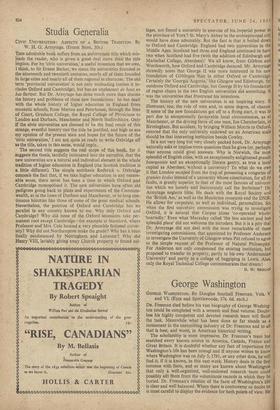Studia Generalia
THIS admirable book suffers from an unfortunate title which mis- leads the reader, who is given a good deal more than the title implies. For by 'civic universities,' a useful invention that we owe, 1 think, to Sir Ernest Barker, we mean the universities founded in the nineteenth and twentieth centuries, nearly all of them founded in large cities and nearly all of them regional in character. The old term 'provincial universities' is not only misleading (unless it in- cludes Oxford and Cambridge), but has an unpleasant de haul en bas flavour. But Dr. Armytage has done much more than discuss the history and problems of these new foundations : he has dealt with the whole history of higher education in England from monastic schools, from Merton and Peterhousc, through the Inns of Court, Gresham College, the Royal College of Physicians to London and Durham, Manchester and North Staffordshire. Only if the civic universities are deemed to be the final result of this strange, eventful history can the title be justified, and high as are my opinion of the present state and hopes for the future of the 'civic universities,' I am not quite as ready to write Oxbridge off as the title, taken in this sense, would imply.
The second title suggests the real scope of this book, for it suggests the thesis, tactfully insinuated into the narrative, that the new universities are a natural and individual element in the whole tradition of higher education in England (the Scottish tradition is a little different). The simple antithesis Redbrick v. Oxbridge conceals the fact that, if we take higher education in any reason- able sense, there never has been a time in which Oxford and Cambridge monopolised it. The new universities have often old pedigrees going back to plans and experiments of the Common- wealth, as in the cases of Durham and Manchester, or to long con- tinuous histories like those of some of the great medical schools. Nevertheless, the position of Oxford and Cambridge has no parallel in any country known to me. Why only Oxford and Cambridge? Why did none of the Oxford secessions take per- manent root except Cambridge—for example at Stamford, where Professor and Mrs. Cole located a very plausible fictional Univer- sity? Why did not Northampton make the grade? Why has it been finally outdistanced by Nottingham and Leicester? Why did Henry VIII, lavishly giving away Church property to found col- leges, not found a university in exercise of his imperial power in the province of York? St. Mary's Abbey in the archiepiscopal city would have done admirably. But the fact is that it boiled down to Oxford and Cambridge. England had two universities in the Middle Ages. Scotland had three and England continued to have two when Scotland had five (with the addition of Edinburgh and Marischal College, Aberdeen)! We all know, from Gibbon and Wordsworth, how Oxford and Cambridge decayed. Mr. Armytage shrewdly notes that George II was more interested in his new foundation of Gottingen than in either Oxford or Cambridge. Certainly the 'Georgia Augusta,' like Glasgow and Edinburgh, far outshone Oxford and Cambridge, but George 11 by his foundation of regius chairs in the two English universities did something. It was the universities that frustrated his intentions.
The history of the new universities is an inspiring story. It illustrates, too, the role of men and, to some degree, of chance. If some of the new foundations got off to a flying start, it was in part due to exceptionally favourable local circumstances, as at Manchester, or the driving force of one man, Joe Chamberlain, in Birmingham. But accident, by bringing William Morris to Oxford, ensured that the only university endowed on an American scale should be that interesting institution beside Cowley.
In a not very long but very closely packed book, Dr. Armytage naturally asks or implies more questions than he gives (or, perhaps, than anyone could give) answers. Why is Norwich, the most splendid of English cities, with an exceptionally enlightened grande bourgeoisie and an exceptionally literate gentry, as true a local capital as Aberdeen, without a university? To what do we owe it that London escaped from the trap of possessing a congeries of grandes &ales instead of a university whose constitution, for all its faults, is greatly superior to that of the most famous of universi- ties which we loosely and inaccurately call the Sorbonne? Dr. Armytage neglects little. He deals with the Royal Society and the 'British Ass,' as well as the Hunterian museums and the DS1R. He allows for corporate, as well as individual, personalities. So, when the first university commission was trying to investigate OxfOrd, it is natural that Corpus alone 'co-operated whole- heartedly.' Even what Macaulay called 'the less ancient and less splendid place' did not welcome the intruders. But it is a pity that Dr. Armytage did not deal with the most remarkable of these investigating commissions, that appointed by Professor Anderson to investigate the University of Glasgow when Pitt refused to agree to the simple request of the Professor of Natural Philosophy. For Anderson not only condemned the existing institution, but proposed to transfer its property, partly to his own 'Andersonian University' and partly to a college of. bagpiping in Lewis. Alas, only the Royal Technical College commemorates that dream!
D. W. BROGAN

















































 Previous page
Previous page